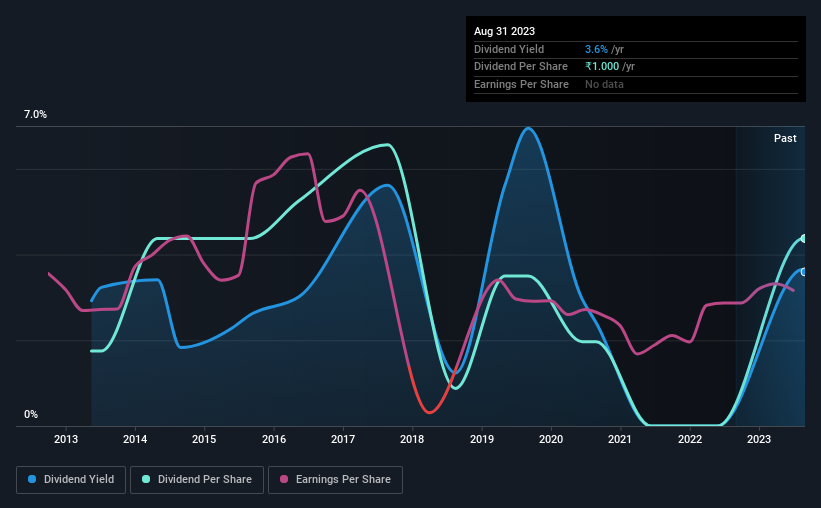Stock Analysis
- India
- /
- Diversified Financial
- /
- NSEI:PFS
There's A Lot To Like About PTC India Financial Services' (NSE:PFS) Upcoming ₹1.00 Dividend

PTC India Financial Services Limited (NSE:PFS) stock is about to trade ex-dividend in 3 days. The ex-dividend date occurs one day before the record date which is the day on which shareholders need to be on the company's books in order to receive a dividend. It is important to be aware of the ex-dividend date because any trade on the stock needs to have been settled on or before the record date. In other words, investors can purchase PTC India Financial Services' shares before the 5th of September in order to be eligible for the dividend, which will be paid on the 12th of October.
The company's next dividend payment will be ₹1.00 per share. Last year, in total, the company distributed ₹1.00 to shareholders. Calculating the last year's worth of payments shows that PTC India Financial Services has a trailing yield of 3.6% on the current share price of ₹27.8. We love seeing companies pay a dividend, but it's also important to be sure that laying the golden eggs isn't going to kill our golden goose! As a result, readers should always check whether PTC India Financial Services has been able to grow its dividends, or if the dividend might be cut.
View our latest analysis for PTC India Financial Services
Dividends are typically paid out of company income, so if a company pays out more than it earned, its dividend is usually at a higher risk of being cut. Fortunately PTC India Financial Services's payout ratio is modest, at just 36% of profit.
Companies that pay out less in dividends than they earn in profits generally have more sustainable dividends. The lower the payout ratio, the more wiggle room the business has before it could be forced to cut the dividend.
Click here to see how much of its profit PTC India Financial Services paid out over the last 12 months.

Have Earnings And Dividends Been Growing?
Companies that aren't growing their earnings can still be valuable, but it is even more important to assess the sustainability of the dividend if it looks like the company will struggle to grow. Investors love dividends, so if earnings fall and the dividend is reduced, expect a stock to be sold off heavily at the same time. With that in mind, we're not enthused to see that PTC India Financial Services's earnings per share have remained effectively flat over the past five years. We'd take that over an earnings decline any day, but in the long run, the best dividend stocks all grow their earnings per share.
Another key way to measure a company's dividend prospects is by measuring its historical rate of dividend growth. Since the start of our data, 10 years ago, PTC India Financial Services has lifted its dividend by approximately 9.6% a year on average.
Final Takeaway
Is PTC India Financial Services an attractive dividend stock, or better left on the shelf? Earnings per share have been flat in recent years, although PTC India Financial Services reinvests more than half its earnings in the business, which could suggest there are some growth projects that have not yet reached fruition. In summary, PTC India Financial Services appears to have some promise as a dividend stock, and we'd suggest taking a closer look at it.
On that note, you'll want to research what risks PTC India Financial Services is facing. For example - PTC India Financial Services has 3 warning signs we think you should be aware of.
If you're in the market for strong dividend payers, we recommend checking our selection of top dividend stocks.
Valuation is complex, but we're helping make it simple.
Find out whether PTC India Financial Services is potentially over or undervalued by checking out our comprehensive analysis, which includes fair value estimates, risks and warnings, dividends, insider transactions and financial health.
View the Free AnalysisHave feedback on this article? Concerned about the content? Get in touch with us directly. Alternatively, email editorial-team (at) simplywallst.com.
This article by Simply Wall St is general in nature. We provide commentary based on historical data and analyst forecasts only using an unbiased methodology and our articles are not intended to be financial advice. It does not constitute a recommendation to buy or sell any stock, and does not take account of your objectives, or your financial situation. We aim to bring you long-term focused analysis driven by fundamental data. Note that our analysis may not factor in the latest price-sensitive company announcements or qualitative material. Simply Wall St has no position in any stocks mentioned.
About NSEI:PFS
PTC India Financial Services
PTC India Financial Services Limited, a non-banking finance company, provides various financing solutions.
Established dividend payer with proven track record.

